Iran Says Talks With Saudi Arabia Have Gone A 'Good Distance'
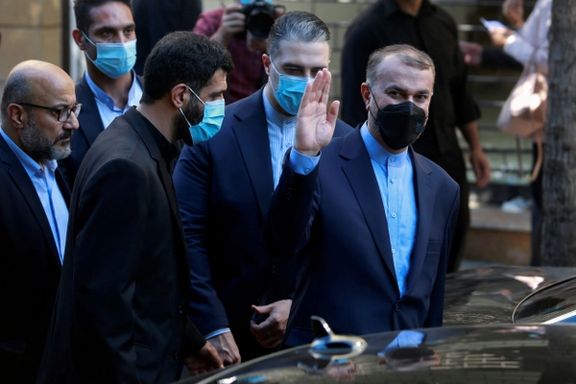
Talks to improve relations between Iran and Saudi Arabia have gone a "good distance", Iran's Foreign Minister told a news conference in Beirut on Thursday.

Talks to improve relations between Iran and Saudi Arabia have gone a "good distance", Iran's Foreign Minister told a news conference in Beirut on Thursday.
Hossein Amir-Abdollahian is visiting Lebanon where he promised help to the economically ravaged country.
Iran and Saudi Arabia, the leading Shi'ite and Sunni Muslim powers in the Middle East, have been rivals for years, backing allies fighting proxy wars in Yemen, Syria and elsewhere. They cut diplomatic ties in 2016. Saudi Foreign Minister Prince Faisal bin Farhan confirmed on Sunday that his government had held its first round of direct talks with Iran's new government last month, part of a process begun earlier this year to reduce tensions.
Three rounds of Saudi-Iranian talks were held in Iraq in the months before Iran's new hardline president, Ebrahim Raisi, took office in August.
Prince Faisal said the latest round had taken place on September 21 but did not say where.
The United States and its European and Middle Eastern allies have called on Iran to change its policy of interference in regional countries as part of ongoing nuclear talks with Tehran.
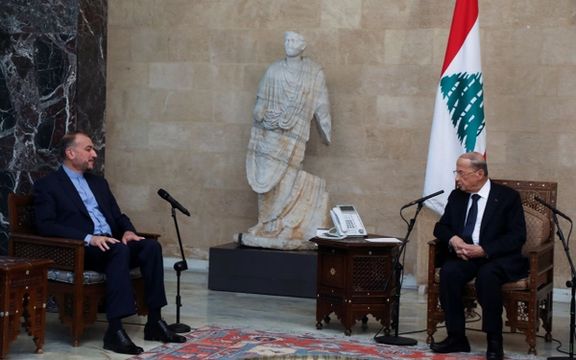
Iran's Hossein Amir-Abdollahian told President Michel Aoun in Beirut Thursday that Tehran would offer any help required by Lebanon, which faces multiple crises.
News agencies of the two countries have so far reported few details of the meeting between Iran’s foreign minister and the president, who leads the mainly-Christian Free Patriotic Movement allied to Hezbollah.
On arrival at Beirut airport Thursday after wrapping up a two-day visit to Moscow, Amir-Abollahian told Iranian state television (IRIB) that Tehran Iran had "better and newer propositions for breaking Lebanon's economic siege."
He said his trip was “indicative of deep and friendly ties between the two countries, and we support Lebanon’s army, people, and resistance with a strong voice.”
The Iranian foreign minister also met with parliament speaker Nabih Berri, leader of the mainly Shia Amal party, and is scheduled to meet Prime Minister Najib Mikati, Foreign Minister Abdullah Bou Habib, and representatives of Palestinian groups.
On Monday Hezbollah Secretary-General Hassan Nasrallah said third and fourth consignments of fuel were on their way to Lebanon.
“Paperwork has been done for the dispatch of the third gasoline-laden ship from Iran,” he said in a speech. “The fourth ship will bear diesel and will be sent over subsequently.”
Lebanon faces chronic shortages of petrol and diesel – the latter used for electricity generation by hospitals, apartments and other buildings – as the Lebanese pound has collapsed against the dollar, plunging around 80 percent of the population into poverty.
The United States has been enforcing sanctions against Lebanon for more than a year to pressure the country to curb political and military influence of Hezbollah, which is well represented in the Lebanese parliament and allied to Tehran. These sanctions have compounded the country’s economic problems.
Iranian officials say fuel bound for Lebanon was purchased by Lebanese Shiite merchants but have not explained how payment – which would contravene US sanctions against Iran – might be made. Vessels from Iran deliver the fuel to Syria from where it is delivered to Lebanon by trucks.
A third tanker carrying fuel arrived in the Syrian port city of Baniyas Wednesday. The first convoy of fuel trucks entered Lebanon on September 16. It is not clear how much of the fuel has been transported to Lebanon by land so far for which thousands of trips are required.
On Tuesday Shabab Hezbollah, a pro-Hezbollah social media Twitter account, reported that a convoy of around 60 trucks, the tenth such convoy, had entered Lebanon from Syria.
The initiative, which Hezbollah said had broken an "American siege" irritated some factions in Lebanon that said the party had not sought the government's approval for importing fuel from Iran. Hezbollah's opponents accused the group of undermining state authority and exposing Lebanon to the risk of further US sanctions.
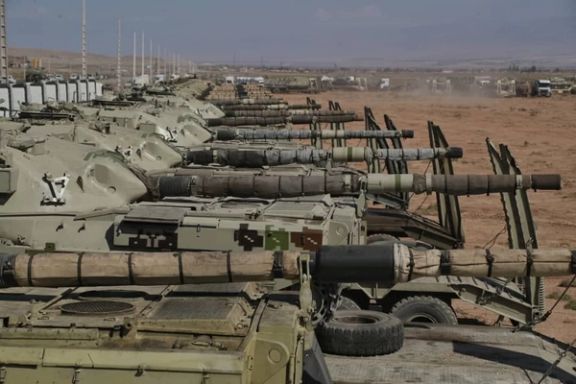
The ideology chief of the Revolutionary Guard has said that Iran will not allow “Takfiris or Zionist terrorists” to create a “nest” at its northwestern borders.
In recent weeks tensions have increased between the Islamic Republic and its northern neighbor Azerbaijan, with Iran accusing Baku of harboring Israeli and jihadist elements on its territory and attempting to change borders at the expense of Armenia.
General Rasul Sanaeirad, who is a deputy commander of the Islamic Revolution Guard Corps (IRGC) in charge of ideology said that Iran has been careful not to instigate conflicts and tensions over the years, but it had to conduct military drills last week to send a message.
Iran massed large number of troops and weapons near the Azerbaijani borders and held drills, citing exercises by Azerbaijan, Turkey and Pakistan near its borders.
Sanaeirad added that the military drills also send a message to “powers behind the scenes” who were instigating tensions. He did not name those countries.
He added, “Iran opposes any kind of geopolitical changes in the region and regards as important the security, territorial integrity and the rights of its neighbors.”
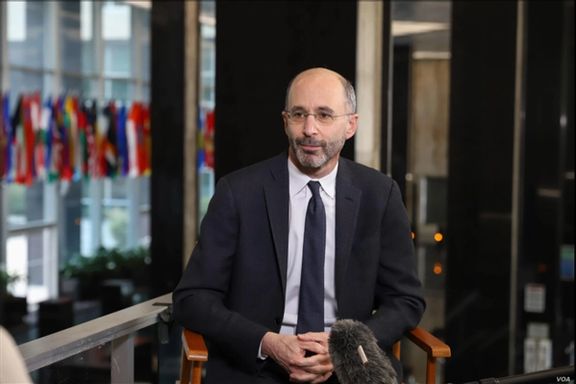
US Special Envoy for Iran held spoke Thursday with a South Korean diplomat to discuss cooperation over negotiations to restore the 2015 Iran nuclear deal.
The South Korean news agency Yonhap issued a brief report on Robert Malley’s discussion with First Vice Foreign Minister Choi Jong-Kun but provided no details about how South Korea can help in the process of talks with Tehran.
Two South Korean banks hold $7 billion of Iran’s funds from the time when Seoul was purchasing oil from Tehran before full US sanctions on Iran’s crude exports were imposed in May 2019.
Iran has been hinting that the United States should release frozen Iranian funds before it returns to the talks. Iran’s Foreign Minister Hossein Amir-Abdollahian told Iranian state television on October 2 that he refused overtures to meet with US officials while he was attending the UN General Assembly in New York in September, asking that Washington should first unfreeze $10 billion.
It is not clear if Malley’s conversation with the South Korean diplomat was related to the issue of the frozen funds, or whether the US intends to release them to convince Iran to return to the Vienna negotiations. Malley asked for South Korea to play a “constructive” role in efforts to resume the negotiations.
However, Choi reiterated South Korea’s willingness to provide support necessary for the resumption of the nuclear talks "in consideration of the importance of Seoul-Tehran relations,” Yonhap quoted the foreign ministry as saying.
Iran left the Vienna multilateral nuclear talks aimed at restoring the 2015 nuclear deal, JCPOA, in June, saying its new president needed time to form a government, but has so far not set a date for its return.
The United States, the United Kingdom, France and Germany that have been negotiating with Iran since April have warned that time is running out for fruitful talks as Iran continues to enrich uranium and advances its nuclear program that would make the revival of the agreement impossible.
Washington and its European allies have said they will make no new concession to Tehran until it returns to the talks based on what has so far been offered by the West.
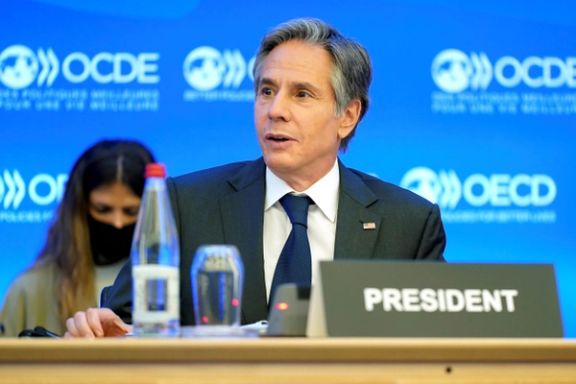
US Secretary of State Antony Blinken has again warned in Paris that time is running out for reaching an agreement on restoring the nuclear agreement with Iran.
Blinken said on Wednesday that he has spoken with his Russian counterpart, Sergei Lavrov, on restoring Iran's nuclear deal with the world powers and that Moscow and Washington had a shared interest restarting talks as soon as possible.
"We had an opportunity to compare notes on where we stand and where we hope to go," Blinken said at a news conference.
Lavrov said that talks to restore the deal "should be resumed as soon as possible." But Lavrov stressed that the world wants the US to “return to the obligations of the nuclear deal” and in reference to US sanctions, stop the "illegal restrictions on Iran and all of its trading partners," he said.
"The United States and Russia, I think, (are) sharing an interest in seeing a mutual return to compliance with the JCPOA … We had an opportunity to compare notes on where we stand, and where we hope to go," Blinken said at a press conference in Paris.

The military adviser to Supreme Leader Ali Khamenei warned Wednesday that Iran would not accept “any bordering country” hosting "anti-Iran terrorist groups."
“We warn that we will deal with counter-revolutionary groups anywhere on the borders around our country, where governments host them and provide them with facilities and weapons,” Major-General Yahya Rahim-Safavi told Defa Press, news agency of the Iranian Armed Forces.
Rahim-Safavi, a former commander-in-chief of the Revolutionary Guards (IRGC), called in particular on the Kurdistan Regional Government (KRG) in Iraq not to allow bases for such groups.
In recent days, Iran has also been warning neighboring Azerbaijan about what it alleges are foreign jihadist groups near its borders. The accusation goes back to last year's Armenia-Azerbaijan conflict when reports emerged of Arab Sunni militants fighting on the Azerbaijani side.
Several Iranian Kurdish parties committed to autonomy − including the Kurdistan Democratic Party of Iran (KDPI), Komala and Pejak (the Free Life Party of Kurdistan) − have bases in northern Iraq with varying degrees of tolerance from the Iraqi Kurdish authorities and parties.
On Monday, Foreign Ministry Spokesman Saeed Khatibzadeh said Iran had lost “strategic patience,” and that both the KRG and the Baghdad government needed to shut down, in accordance with international law, bases where "armed grouplets train to attack Iran."
Other officials including Major-General Mohammad Bagheri (Baqeri), chairman of the Iranian Chiefs of Staff, and Intelligence Minister Esmail Khatib have issued similar warnings to the KRG in recent weeks.
Iran's armed forces have for decades carried out cross-border attacks on Iranian Kurdish groups in northern Iraq, sometimes prompting the Iraqi Kurdish parties to restrict their activities. The Iranian Kurdish parties have carried out sporadic attacks while concentrating on maintaining a presence inside Iranian Kurdistan.
In June Iran and Turkey conducted joint operations against forces of the Kurdistan Workers Party (PKK) and its Iranian affiliate, Pejak, in Kurdish Iraq. Iran also bombarded the positions of other Kurdish groups, including the KDPI and Komala.
Iran used combat drones and artillery September 9-10 in repeating these attacks. This came three days after General Mohammad Pakpour, commander of IRGC Ground Forces, had complained to Erbil and Baghdad over the freedom of movement of Kurdish fighters near the border and warned civilians to keep away from the groups’ headquarters to avoid danger.
The Iraqi army chief of staff Abdul Amir Rashid Yarallah on September 21 called Iranian claims over the Kurdish groups “unjustified” and insisted Baghdad “strongly rejects the use of its territory for aggression against its neighbors.” Yarallah asked “everyone to adhere to the language of brotherhood and cooperation in joint relations.”
Iran has options for escalation. Three years ago it fired ballistic missiles at the KDPI headquarters in Koysanjak, northern Iraq, killing at least 16.